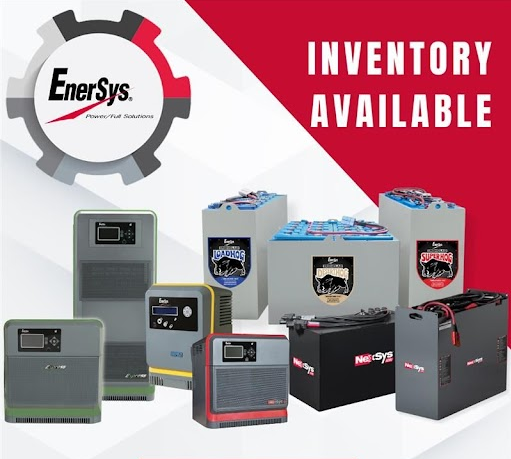Used Batteries for Your Warehouse: Smart Move or HUGE Mistake
Let’s be real. Warehouse operations are expensive. Between labor, equipment, maintenance, and those unexpected breakdowns that seem to happen only when the boss is visiting—cutting costs is always on our radar.
So, naturally, you might be thinking: “Used batteries for our warehouse equipment? That could save us thousands!”
But here's the million-dollar question: Is that actually a smart move… or are you signing yourself up for one HUGE mistake?
Let’s dig into it.
The Real Cost of a "Good Deal"
Used forklift batteries and chargers—like Used Enersys Chargers—are often marketed as budget-friendly solutions. And yes, on paper, the price tag looks pretty sweet. Sometimes you can snag one for half (or less) than the price of a new unit.
But ask yourself: is it cheap, or is it cost-effective?
Here’s What You Need to Consider:
1. Battery Cycle Life
Industrial batteries aren’t immortal. They come with a limited number of charge/discharge cycles. A brand-new lead-acid battery averages about 1,500 cycles. If you’re buying used, you’re essentially guessing how many lives it has left—like a forklift version of Russian roulette.
2. Performance Under Load
Used batteries can look great and still fail under pressure. Ever seen a fully charged battery drop power halfway through a shift? Yeah… not ideal when your warehouse team’s on a tight deadline.
3. Charger Compatibility
Especially with brands like Enersys, compatibility matters. Mismatched or damaged chargers can reduce battery lifespan even more—or worse, pose safety risks.
4. Maintenance History (Or Lack Thereof)
Unless you're getting it from a reputable source (hi, Warehouse Buyers Club 👋), you may not have a full picture of how the battery was treated. Overcharged? Underwatered? Overworked? Who knows.
Warehouse 101: Understanding Battery Grades
Let’s keep this simple. Think of battery grades like used cars:
-
Grade A: Lightly used, low cycles, well-maintained. Usually comes from companies that upgrade early.
-
Grade B: Moderate use, still serviceable, may need a little TLC.
-
Grade C: Heavily used, near end-of-life. Bargain-bin pricing for a reason.
If you’re buying used batteries, make sure you know the grade and get a load test. No exceptions.
Did You Know?
The average cost of downtime due to equipment failure in a warehouse is $260 per hour. One dead battery at the wrong time, and that “cheap” used unit just cost you a forklift driver's entire shift.
When Used Batteries Do Make Sense
Now let’s be fair. Used batteries aren’t all bad. In fact, there are times when they’re a smart move, such as:
-
Short-Term Projects: Temporary warehousing or seasonal overflow? A used battery can bridge the gap without denting your capital budget.
-
Backup Units: If it’s not a primary forklift or pallet jack, a used battery might be just fine for occasional use.
-
Refurbished With Warranty: Some reputable sellers recondition batteries and offer limited warranties. This isn’t the same as buying something from “Joe’s Forklift Emporium” off Craigslist.
Pro Tip from the CEO Chair: Think of used batteries like dating apps—if it looks too good to be true, it probably is. Swipe left unless it comes with a solid profile (ahem, test results and a warranty).
What About Used Enersys Chargers?
Let’s talk chargers—because no battery, new or used, works without one.
Used Enersys Chargers are solid equipment IF:
-
They're tested and in good working condition.
-
The voltage matches your battery bank.
-
You verify that it hasn’t been tampered with.
You’ll want to check for error codes, temperature sensors, and age. Anything over 7–10 years? Probably time to pass, unless you're buying it for parts or as a backup.
The Final Verdict: Smart Move or HUGE Mistake?
It depends.
If you're strategic, work with reputable vendors, and understand the true condition of what you're buying—used batteries (and chargers) can save you a lot of money.
But if you're cutting corners, buying blindly, or hoping for a miracle—you’re setting yourself up for expensive downtime, frustrated team members, and possibly even safety risks.
From one operator to another: You wouldn’t skip the inspection on a used forklift, so don’t do it with your power source either.
Key Takeaways:
-
Not all used batteries are created equal—get test results and warranty when possible.
-
Used Enersys chargers can be a great value—but check voltage, compatibility, and age.
-
Know the battery grade and remaining cycles before buying.
-
Factor in potential downtime costs and safety risks.
- Partner with someone who knows the game (cough—Warehouse Buyers Club—cough).
Final Thought from the CEO Desk:
Look, we all want to stretch every dollar. That’s just smart business. But sometimes, the best ROI comes from investing in reliability—not rolling the dice.
If you’re going to buy used, buy smart.
If you’re unsure, ask someone who does this every day.
And if your current battery guy drives a van with no logo and doesn’t send invoices? Might be time for an upgrade.




